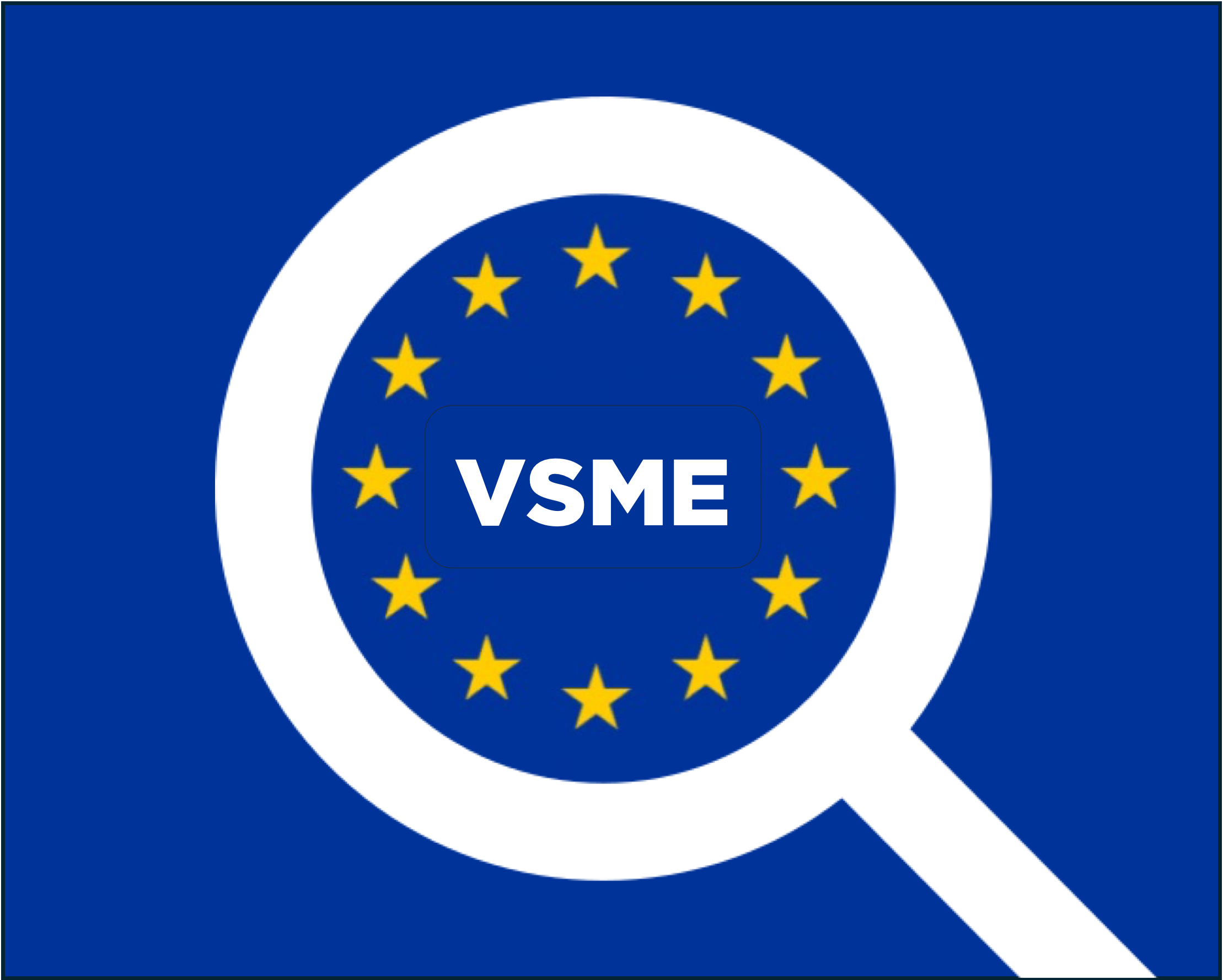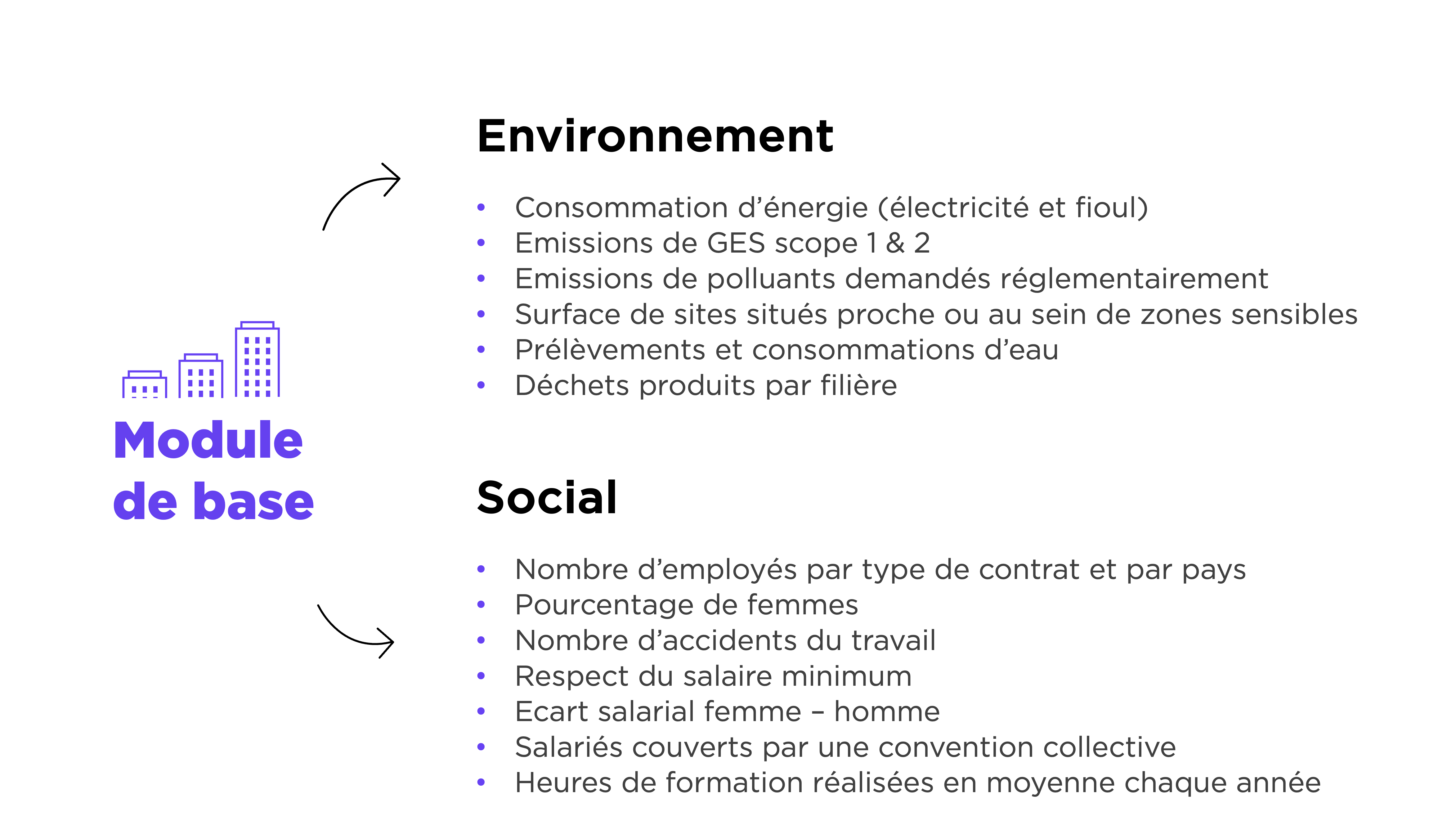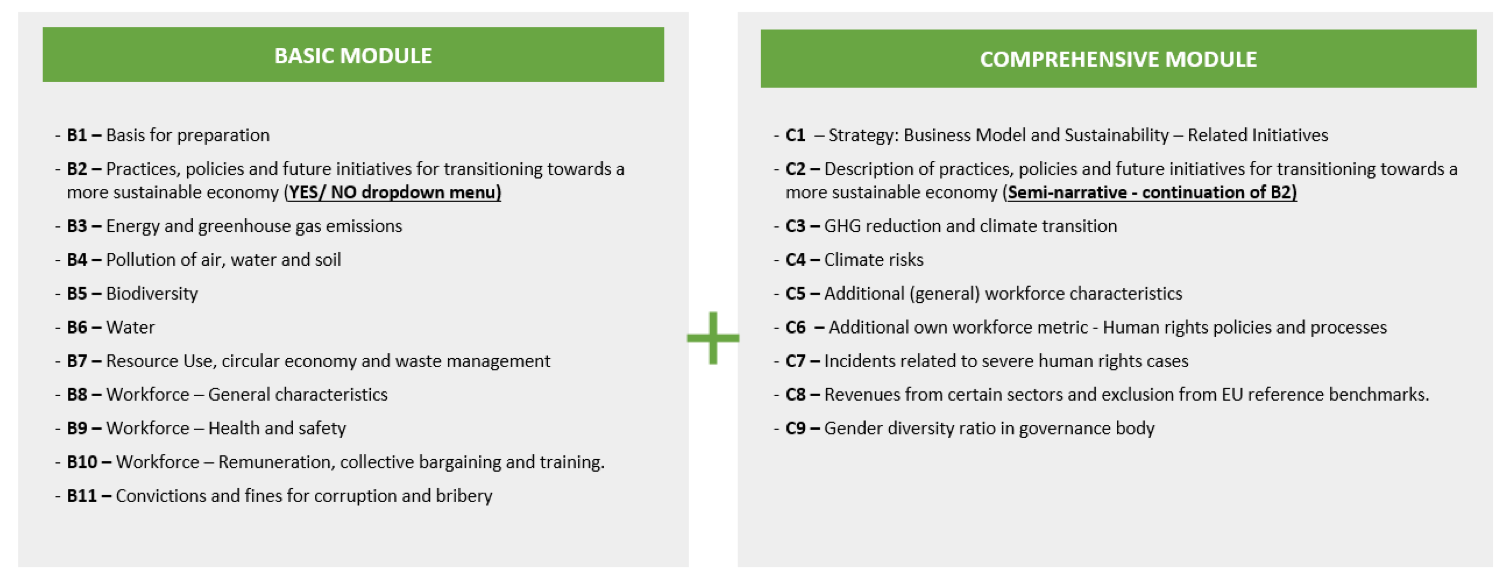This website uses cookies so that we can provide you with the best user experience possible. Cookie information is stored in your browser and performs functions such as recognising you when you return to our website and helping our team to understand which sections of the website you find most interesting and useful.

VSME and CSRD: Understanding Everything About the New Regulation for SMEs
Publié le 29 December 2024
A new voluntary CSR reporting standard for SMEs
The « Voluntary Sustainability Reporting Standard for non-listed SMEs » (VSME) is a norm originally developed by the EFRAG for VSBs and SMEs with fewer than 250 employees and not subjected to the CSRD. Since February 2025, it has also been recommended for companies with 250 to 1,000 employees, following the Omnibus simplification effort by the European Commission. The norm is designed to provide these businesses with a simplified framework enabling them to share relevant information about their environmental, social, and governance (ESG) performance
Unlike the CSRD, this standard is currently voluntary. No sanctions or penalties are yet planned for companies that choose not to adopt it.
For whom is this new standard intended?
- Micro-enterprises, not exceeding two of the following three criteria: 10 employees, €700,000 in revenue, and €350,000 in total assets.
- Small enterprises, not exceeding two of the following three criteria: 50 employees, €8 million in revenue, and €4 million in total assets.
- Medium-sized enterprises, not exceeding two of the following three criteria: 250 employees, €40 million in revenue, and €20 million in total assets.
Following the presentation of the Omnibus directive on February 26, 2025, it is expected that this standard will also apply to companies with 250 to 1,000 employees, which were previously subject to the CSRD. The first recommendations from the European Commission support this expansion, and further clarifications are expected in the coming months.
What are the differences with the CSRD?
The VSME supports SMEs, and mid-sized enterprises with fewer than 1,000 employees in their sustainability efforts through its simplified framework. Less demanding than the CSRD in terms of data volume, it still includes the same key topics, such as climate change, biodiversity, and working conditions.
It shares the same ambitions as its big sister, the CSRD:
- Directing capital flows toward the most sustainable businesses.
- Providing transparency and comparability across companies.
- Integrating sustainability into corporate evaluation criteria.
The VSME adopts the CSRD’s core transparency principles while simplifying them into two modules:
- A mandatory basic module incorporating essential CSR issues and key indicators for micro-enterprises, serving as the minimum starting point for small and medium-sized businesses. The requirements are streamlined as much as possible to simplify data collection and report preparation.

- A complementary module incorporating recommended indicators and narrative elements tailored for small and medium-sized enterprises. These elements compile the information that may be requested by investors, banks, and clients as part of their own CSRD compliance process.

Source : EFRAG Voluntary Sustainability Reporting Standard for non-listed SMES (VSME) Basis for Conclusions
Why is this standard crucial for SMEs?
Although this framework is purely voluntary, it serves as a valuable tool for small businesses looking to structure and develop their CSR strategy or simply continue their sustainability efforts. Here are 3 key reasons to adopt it:
- Meeting stakeholder expectations (clients, partners, investors): Even if a company is not directly subject to the CSRD, it will gradually be impacted by the requests of clients who are. As part of their CSRD compliance, these companies are encouraged to involve their entire value chain in preparing their reporting, including collecting carbon data and social indicators from suppliers.
- Standing out to clients and strengthening brand image: By demonstrating transparency in ESG performance, a business can establish itself as a responsible player and build trust with its stakeholders.
- Retaining employees and attracting talent: Developing and maintaining a CSR strategy helps unite teams, boost company attractiveness, and foster a sense of pride.
Our convictions for a successful VSME compliance
To effectively align with the VSME, we have 4 key convictions:
- Conviction #1: Engage and train your teams in CSR. Before considering compliance, it is essential to raise awareness among your employees and initiate a company-wide CSR approach involving all departments (procurement, operations, HR, etc.).
We offer a one-day training program, ‘Launching Your CSR Initiative,’ to collectively reflect on CSR and define your framework.
- Conviction #2: Evaluer votre maturité RSE : Assess your CSR maturity: It’s difficult to determine where to go if you don’t know where you’re starting from. Based on the VSME themes, it is crucial to evaluate your company’s current sustainability level. Several frameworks exist for this purpose, with the EcoVadis assessment being the most widely recognized and frequently used. Looking to complete this assessment and aim for a medal? Our teams can support you through this process as we are an official EcoVadis Training Partner
- Conviction #3: Set precise objectives and a clear action plan: Beyond compliance, this new standard is an opportunity to transform your business, set ambitious CSR goals, and integrate them into your strategic roadmap. We offer a comprehensive four-step support program to help you define your CSR strategy and build your first action plan.
- Conviction #4: Rely on proven tools: The simplified VSME framework provides document templates to help businesses collect, analyze, and present their data in a coherent and compliant manner. To effectively manage your sustainability approach over time, dedicated tools and integrated CSR platforms are available to centralize and efficiently handle your data
Our CSR experts can support you every step of the way
Would you like support for your VSME compliance? Our team of experts is available to answer your questions through an initial free assessment




